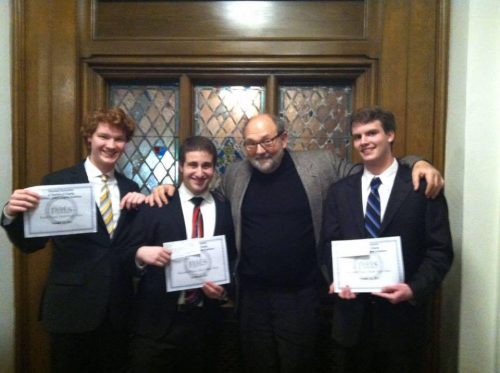
Robert Swensen with three of his tenor students, after the students won the 2015 NATS auditions (L-R: Henry Benson, Nathanial Bear and Patrick Kelly).
by Andrea Schuler, Summer@Eastman Program Coordinator
Eastman voice professors Robert Swensen and Kathryn Cowdrick have created a brand-new workshop for Summer@Eastman 2017: Schubert to Sondheim: Pedagogy for the Male Voice (July 17-21). Together with Eastman alum Michael Hanley (BM ’11), a former student of Kathryn’s and now a member of the musical theatre faculty at The Boston Conservatory, they will discuss concepts important to the training and development of the male voice in both classical and musical theatre styles. I asked Robert, Kathryn and Michael about the new institute, vocal pedagogy for male singers, and the similarities and differences between the singing styles.
What inspired you to create this course?
RS: For the past 15 years, I have been presenting a course at the Classical Singer Magazine competition and college fair that was designed to address the understanding of how the male voice in classical singing should be trained. The goal was to help inform both male and female teachers and male students with discussion and master class performances. Those presentations evolved into this summer’s course. [Note: Robert has also written about this topic for Classical Singer magazine; his article “Training the Young Male Voice” appeared in the September 2015 issue. Kathryn, in addition to teaching at Eastman, is also a speech pathologist; she will be reviewing vocal mechanics, vocal health, and what teachers can expect to hear in singers as they age.
Why did you decide to focus this class only on pedagogy for male voice students? What factors or concerns should teachers be most aware of when teaching a male student?
RS: In the voice teaching community, there often appears to be some confusion in understanding how the male voice works, especially in the way one must teach the equalization of the registers. Men access the top of their voices in a different way. It is important for female teachers who have never sung in this way to be given specific information and training exercises. It will help their young male singers gain technical security. We are hoping teachers of both genders will be interested in sharing ideas during this week of pedagogy.
Tell us about guest instructor Michael Hanley. What is his background, and what will he be presenting during the workshop?
KC: Michael received his BM in Music Education from Eastman (where he was also a UR Kauffman Entrepreneurial Scholar); he went on to receive an MM in Performance and Vocal Pedagogy from Penn State University. He is a terrific young teacher and was recently selected as one of the 2016 NATS Teaching Interns. At this summer’s workshop, he will speak about technical training of the male voice in musical theatre, demonstrate healthy technique, and help suggest good repertoire for students.
What are some of the key differences between classical technique and musical theatre technique? What concepts do singers need to understand in order to sing both styles successfully?
MH: Musical theatre pedagogy, like classical pedagogy, begins by establishing and reinforcing the fundamentals of voice production (body alignment, breath awareness, healthy phonation, and articulation), but it departs from classical pedagogy relatively early in the training process. The development of the speaking voice and speech-related sounds is essential to musical theatre technique.
Students should understand the relationship between the training they receive in voice/speech classes and the work they do in the singing voice studio. Speech-related sounds ask the singer to use a laryngeal position that can be slightly higher than in classical singing, and also to cultivate the ability to move between different laryngeal positions. You can imagine that the breath energy and continuity required for classical repertoire would not be appropriate in these sounds.
Furthermore, speech-related sounds will not have all of the acoustic power that classical singing has (and requires). Beginning students need to be aware of the acoustic limitations of these sounds and understand how to work with amplification, which has become standard in almost every performing venue for musical theatre.
What can students of each style learn from the other that will help them become better artists overall?
MH: Since the style of musical theatre often demands lighter sounds and a large variety of vocal colors, singers need to develop a lighter singing mechanism. While this lighter mechanism may not be needed on the operatic stage, classical singers can benefit from the exploration of these sounds for use in art song, in the teaching studio, and as a general tool for laryngeal flexibility. Furthermore, development of healthy speech sounds is crucial for any singer in order to maintain his or her instrument and incorporate healthy speaking habits into everyday life.
Musical theatre singers benefit significantly from classical pedagogy. Since most “legit” musical theatre canon asks for a mixture of classical sounds and speech-based sounds, it is often difficult for singers to integrate these technical demands. It is important for young musical theatre singers to work on classical technique and repertoire in order to develop an understanding of the function that is required. Men must also become familiar with the intricate acoustic demands of classical singing and negotiation of the passaggio; many demands in musical theatre repertoire mirror the demands of classical music.
Any final thoughts about keys to success in both styles?
KC: Vocal health and longevity are crucial, and the most important thing for longevity in either style is training. For too long, singers may sing on sheer talent alone. Training will ensure that the voice develops fully and that the demands of singing musical theatre every night for weeks does not impact the vocal health of the young male singer. Good training starts with a classical mindset: technical expertise allows artistry to bloom.